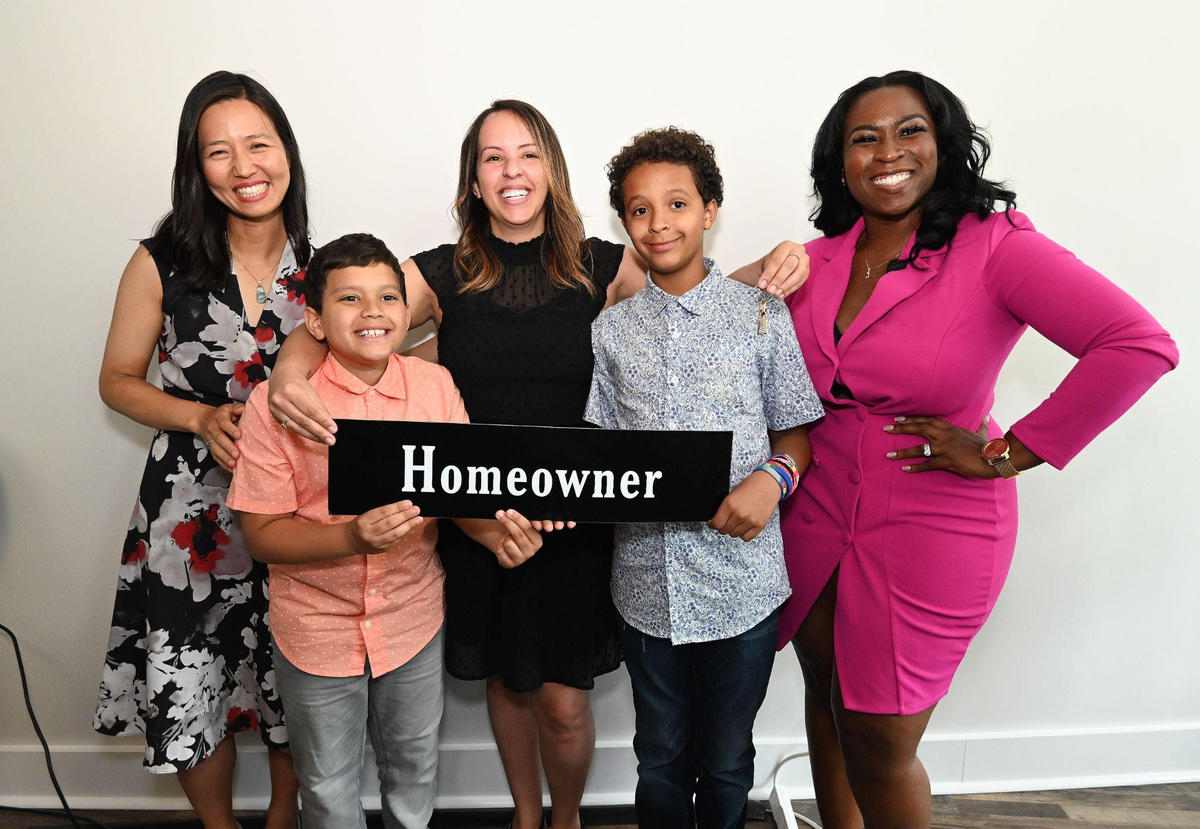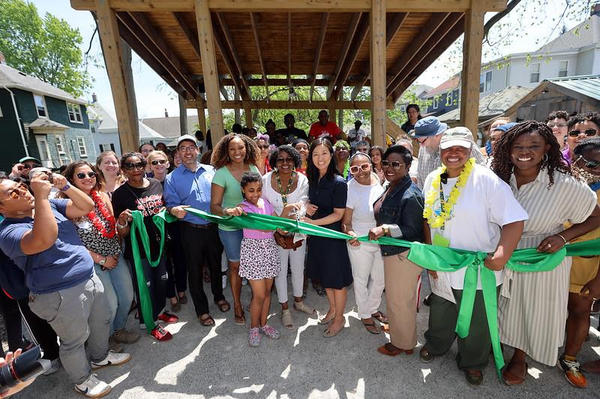June 2023: Latest Updates from the Mayor's Office of Housing
Read the latest updates from the Mayor's Office of Housing.
THE BOSTON HOME CENTER CELEBRATES ASSISTING 400 NEW HOMEOWNERS IN BOSTON
Thanks to new funding allocated from the American Rescue Plan Act (ARPA) by Mayor Michelle Wu, a total of 75 Boston families have realized their dreams of homeownership. This funding provided support through discounted interest rates, as well as enhanced down-payment and closing cost assistance. These home sales represent a significant achievement in pursuit of Mayor Wu’s stated commitment to promoting generational wealth and fostering diverse communities by empowering residents of color in Boston to become homeowners; 71 percent of the 75 homebuyers are persons of color.
In addition, the ONE+Boston program celebrated its three-year anniversary last month. This initiative has been instrumental in providing mortgage subsidies and reducing interest rates for borrowers, and has resulted in 325 new homeowners since it began. Sixty-seven percent of these loans were secured by BIPOC borrowers. Originally seeded with $4 million, the ONE+ Boston program has been so successful that its allocation is now $10 million.
OVER 200 HOMEOWNERS ASSISTED WITH CRUCIAL HOME REPAIRS
For fiscal year 2023, the homeowner services team provided assistance to 212 residents in Boston who were in need of urgent home repairs—57 were seniors. This is the highest number of seniors assisted with home repair in over 20 years.
The repairs encompassed a wide range of issues, from minor fixes such as broken steps to more substantial tasks like patching up roof holes. These projects were essential for ensuring the health and safety of the residents, regardless of their age. The home repair programs offer zero percent interest, deferred payment home repair loans and specifically caters to owner-occupant homeowners of 1-4 family homes, as long as they meet the criteria of earning less than 80 percent of the Area Median Income (AMI) as defined by the HUD Income Limits.
MOH RECEIVES A STRONG RESPONSE TO THE GREEN ENERGY RETROFIT PROGRAM
The Mayor's Office of Housing (MOH) has received an impressive response to the Request for Proposals (RFP) for comprehensive energy assessments as part of the Large Building Green Energy Retrofits program.
MOH received 21 applications, encompassing more than 50 buildings and over 2,100 units throughout the city. These assessments will play a crucial role in helping projects determine the scope of deep green energy retrofits needed for each building. The high number of applications demonstrates strong interest and commitment to improving energy efficiency and sustainability in Boston's affordable housing developments.
Boston's Large Building Green Energy Retrofits program, funded by the American Rescue Plan Act, aims to enhance energy efficiency in income-restricted housing developments. With over $10 million in funding, the program will reduce energy consumption and costs, enhance indoor air quality, increase occupant comfort, and decrease carbon emissions. Measures include installing energy-efficient lighting and HVAC systems, insulation and weatherization upgrades, renewable energy sources like solar panels, and energy-saving practices. The program offers economic benefits such as lower operating costs, reduced utility bills for tenants, and increased property values for owners. The initiative aligns with Boston's goal of achieving carbon neutrality by 2050.
GROWBOSTON CELEBRATES THE OPENING OF THE EDGEWATER FOOD FOREST
The Edgewater Food Forest recently opened its doors. This achievement was made possible through the joint efforts of community members, the Edgewater Neighborhood Association, and the Boston Food Forest Coalition.
Their collaborative work involved the transformation of a previously vacant lot into a vibrant community space. In the summer of 2021, the Boston Food Forest Coalition purchased two parcels of land measuring 11,816 square feet from MOH to establish the neighborhood food forest and a gathering place for the community.
To support the initial construction of the forest, MOH allocated $125,000 in Grassroots funds in 2021. Furthermore, in 2022, the Community Preservation Act granted an additional $104,369 to facilitate further site improvements. It is worth noting that this is the sixth project undertaken by Boston Food Forest Coalition on land previously owned by the City.
THE OFFICE OF HOUSING RECEIVES ADDITIONAL $16.5 MILLION FOR HOMELESSNESS PREVENTION
Last month, Mayor Wu announced that the City of Boston has secured a $16.5 million grant from the U.S. Department of Housing and Urban Development (HUD) to address unsheltered homelessness.
The funding will be used over three years to expand the City's housing-centered approach to the intersecting crises of unsheltered homelessness, substance use disorder, and mental health centered around Massachusetts Avenue and Melnea Cass Boulevard.
Along with the funding, the City will receive 76 stability vouchers to support residents and families in maintaining housing. The grant will create 372 housing opportunities for individuals and families with severe service needs and histories of unsheltered homelessness. The funds will be distributed among several organizations, including Eliot Community Services, the Boston Housing Authority, Family Aid Boston, Ecumenical Social Action Committee, and Pine Street Inn.
The grant also leverages over $18 million to support healthcare organizations addressing the needs of individuals experiencing homelessness. The announcement was praised by government officials and healthcare partners for its collaborative and evidence-based approach to homelessness.
THE CITY CELEBRATES CLOSING ON 15 INCOME-RESTRICTED HOMEOWNERSHIP UNITS
The City of Boston and the development firm Urbanica have closed on and will begin construction on a four-story residential building at 120-122 Hancock Street.
The proposed building spans 20,500 square feet, and will feature 15 homeownership units, offering a range of living spaces. Among these units, there will be a mix of three one-bedroom apartments and 12 two-bedroom apartments, catering to diverse housing needs.
All 15 units will be deed-restricted affordable units, ensuring that residents from various income brackets can find a place to call home in our community. Eight of these units will be affordable to households earning up to 80 percent of the Area Median Income (AMI), while the remaining seven units will be affordable to households earning up to 100 percent of the AMI.
ADDITIONAL CONTINUUM OF CARE FUNDING AVAILABLE
MOH is requesting proposals for new, expanded, and reallocated Continuum of Care (CoC) projects that will provide housing and/or services to homeless households in Boston. Awarded proposals will be included in a single citywide application to the US Office of Housing and Urban Development (HUD) on behalf of the Boston CoC.
MOH is releasing this RFP well in advance of the Program Year 2023 CoC NOFO to give prospective applicants lead time to conceptualize new projects, identify potential project partners, and develop a competitive application.
This year's RFP does not require a HUD application to apply. If your submitted proposal is conditionally selected for inclusion in the City’s application to HUD, we will work with you to finalize the HUD application.
Proposals must be submitted by Wednesday, August 16, 2023 at 4pm. Proposals must be submitted through the City’s supplier portal.
For more information and office hour dates, visit the CoC Page.
OFFICE OF HOUSING WELCOMES A NEW DEPUTY DIRECTOR OF POLICY DEVELOPMENT AND RESEARCH
Last month, Karina Oliver-Milchman joined MOH as the new Deputy Director of Policy Development and Research (PD&R). Karina joins MOH from the Metropolitan Area Planning Council (MAPC), where she served as Chief of Housing and Neighborhood Development in the Land Use Department.
In this role, she successfully managed the Housing Division and played a key role in expanding and diversifying the housing supply in the region, aligning with the local objectives and the equity goals outlined in MAPC's MetroFuture plan. Karina also provided valuable housing and planning assistance to municipalities directly, while leveraging her expertise to shape the agency's legislative priorities at both the state and federal levels.



